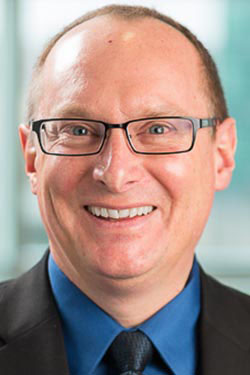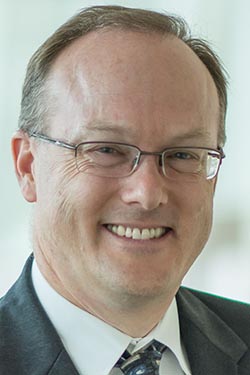 |  |
Robert Bennett, Ph.D. | Andrew Dudley, Ph.D. |
In May, Robert Bennett, Ph.D., became executive chair of the committee. Andrew Dudley, Ph.D., remains vice chair.
The committee is tasked with ensuring ethical and humane treatment of animals within research.
“Our goal is for every valid scientific question being asked that needs animals, to ensure that a protocol can be designed to answer those questions — designed in a way that meets all the ethical standards and required compliance,” Dr. Dudley said. The ultimate goal of the review process is to promote research progress.
Compliance can be a moving target, Dr. Bennett noted. Besides the federal guidelines, different funding agencies may have different criteria for compliance — and increasingly complex proposed protocols keep the committee busy.
“We’re starting to deal with studies that are more challenging,” he said. “There are more parts to the study, there are very different methods being used. This requires us to think at a deeper level, to learn new things, to be able to make certain types of judgments so as this enterprise continues to grow.”
The challenge, they said, is to keep the review process efficient without taking away from UNMC’s high quality and high standards.
To that end, they hope to add new members to the IACUC, to strengthen specific areas of expertise and to make the committee more representative of the diverse research interests at UNMC, UNO, and the VA.
“We are there as a resource,” Dr. Dudley said. “Part of our job is not just to review but really to educate, and we need to make the investigators aware of the rules, aware of how we think about some of the policies, and in doing so help them learn how to work with us.”
Education is an important component of their developing plans to streamline the review process and decrease regulatory burden.
The diversity of UNMC’s research is changing very quickly, both men said, much faster than federal policies are changing.
“That’s where we get into having to make local decisions,” Dr. Dudley said. “Maybe what’s being proposed by an investigator isn’t specifically mentioned in the federal guidelines, because what they’re doing is so cutting edge. So we have to sit down and ask ourselves, ‘What are the ethical concerns surrounding that experiment?’
“Even if there isn’t a mandatory policy that we have to follow, we have to decide what our policy is going to be and how we are going to interpret it.”
Answers to these questions will be developed with input from investigators, they said.

Great team! Congratulations and good luck!
Congratulations Bob!!!